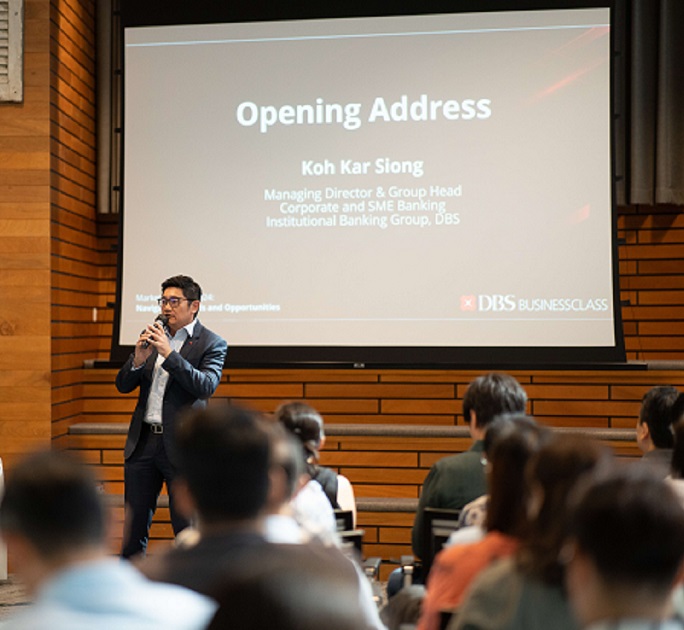Building business resiliency with Budget 2024
Koh Kar Siong, Group Head of Corporate and SME Banking at DBS, gives his take on Budget 2024’s support for local businesses.

The Singapore Budget 2024 has provided some much needed support for mid-sized corporates and SMEs as they face challenges on multiple fronts, from rising costs to a talent crunch.
According the 2024 DBS SME Pulse Check Survey, ensuring consistent cashflow and managing costs remains the top business priority among Singapore’s mid-sized corporates and SMEs. The businesses surveyed also ranked support for rising costs, as well as training and upskilling employees, as their two most important expectations from the Budget, respectively.
Koh Kar Siong, Group Head of Corporate and SME Banking at DBS, shares his thoughts on how local businesses can leverage the Budget’s measures, as well as the bank’s suite of initiatives, to navigate the business landscape and seize opportunities for growth.
What did you think of Budget 2024’s measures to support mid-sized corporates and SMEs? What issues were these measures seeking to address?
This year’s Budget featured a comprehensive list of support measures to help businesses in critical areas such as working capital, reskilling and sustainability. The nature of the support also reflects the increasing importance that the government is placing on building a sustainable future.
I am especially encouraged by the introduction of the SkillsFuture Level-Up Programme, which is a strong endorsement by the government on the importance of lifelong learning and career development. More significantly, this initiative is likely to encourage individuals to actively pursue upskilling, rather than wait for external pressures.
Lifelong learning is key for businesses to remain competitive and innovative in today's rapidly evolving business landscape. The SkillsFuture Level-Up Programme specifically addresses the need for continuous skill development, enabling mid-career and mature workers to stay relevant.
This initiative is especially important for those facing lower re-entry rates post-retrenchment, as it equips them with the skills needed in an economy that is increasingly focused on digitalisation and sustainability. As a SkillsFuture Queen Bee for the last two years, DBS has helped mid-sized corporates and SMEs upskill for business transformation. Going forward, we will be doubling down on our upskilling efforts for businesses.
Additionally, through our engagement with businesses, we know that mid-sized corporates and SMEs are serious about making sustainability an integral part of their business and were hoping for greater clarity on ESG standards. This would be a key enabler to help them quickly get on board the green transition. We look forward to hearing more on this from the government in the near future and be ready to partner businesses in their decarbonisation efforts.
In light of rising business costs, how does the Enterprise Support Package and the adjustments to the Enterprise Financing Scheme aid businesses?
Managing costs is a top concern among local businesses according to our 2024 DBS SME Pulse Check Survey. This is likely to remain a concern this year, with DBS Research forecasting inflation to remain bumpy in 2024.
As such, the Enterprise Support Package is a timely intervention to mitigate the impact of heightened business costs in an uncertain economic environment. By permanently raising the maximum loan quantum for the Enterprise Financing Scheme-SME Working Capital Loan to S$500,000, the Budget directly addresses businesses’ financing needs.
Furthermore, businesses can take advantage of the enhanced co-funding rate of 50% under the progressive wage scheme when they increase their employees’ salaries. This will help businesses better manage costs, while maintaining their ability to retain talent.
The 50 per cent corporate income tax rebate, capped at $40,000, will provide further relief to companies from rising costs.
Can you elaborate on the urgency for mid-sized corporates and SMEs to adopt sustainable practices and how the Enterprise Financing Scheme – Green and the Energy Efficiency Grant (EEG) supports this transition?
It is more critical than ever for mid-sized corporates and SMEs to integrate sustainability into their business models. With stakeholders, consumers, and investors demanding greater transparency on their sustainability impacts, and MNCs facing increased scrutiny over their supply chain emissions, companies that do not start making this transition will risk losing out.
It is thus heartening to see that sustainability was a strong feature in this year’s budget, signalling the paramount importance of businesses to continue the momentum in advancing towards a sustainable future both in Singapore and across the region, with the support from the government.
The Enterprise Financing Scheme – Green and the Energy Efficiency Grant are designed to provide businesses with the necessary financial support to adopt green solutions. In particular, the expansion of the Energy Efficient Grant to cover more sectors such as manufacturing, construction and maritime, is a welcome move as it will help kickstart the sustainability efforts of companies in these high emissions sectors.
How does the enhanced Partnerships for Capability Transformation (PACT) unveiled in the Budget help businesses to plug global supply chains and compete in overseas markets?
Improvements to the PACT program are designed to broaden its scope beyond supplier development and collaborative innovation between large corporations and SMEs to include aspects such as capability training, internationalisation, and corporate venturing.
The enhanced program seeks to equip a wider range of companies with the tools necessary to tap into international supply chains, explore markets abroad and lead in their respective industries.
The program will help businesses scale up and overcome the constraints of Singapore’s small domestic market, to ensure that they can stay competitive in the long term.
How is DBS supporting mid-sized corporates and SMEs and positioning them for long-term growth?
We are deeply committed to supporting mid-sized corporates and SMEs with our comprehensive suite of products and solutions that will provide much needed assistance alongside government initiatives.
One of the key areas that we are focussed on is in helping the underserved segments like heartland merchants and hawkers. Our first in market Heartland Merchant Banking Package is tailored to meet the business banking requirements of heartland businesses, offering insurance coverage and solutions for their day-to-day business needs.
In the area of sustainability, we recognise that mid-sized corporates and SMEs require more support to navigate this journey and we have a suite of resources to enable them to build their capability and capacity for sustainability, whether in the form of education, financing, tracking or connecting them to our ecosystem of partners. In particular, our sustainable financing solutions, such as the Business for Impact Banking Package and the DBS Eco Renovate Loan, are designed to help businesses overcome cost barriers in their sustainability projects.
Recently, we announced our partnership with Sheng Siong to help suppliers become more resource efficient and reduce their carbon footprint through a comprehensive sustainability programme to help businesses identify develop and implement decarbonisation plans. I am thrilled that we will be able to engage up to 1000 SMEs in the Sheng Siong supply chain network over the next two years and contribute towards the development of a more resilient supply chain.
Many businesses are also seeking opportunities for growth in global markets, even as they navigate short-term challenges. With the complexities involved in regional expansion, we hope to support mid-sized corporates and SMEs with our expertise and advisory in navigating the regulatory landscapes of key markets across Asia, including Singapore, Hong Kong, Taiwan, Indonesia, China, and India.
Our network and presence in these markets position us uniquely to assist businesses in realising their expansion ambitions, providing them with the tools and knowledge to succeed on a regional and global stage.


